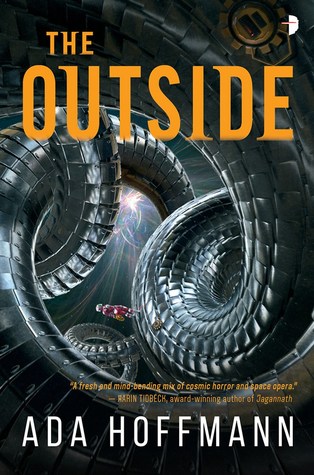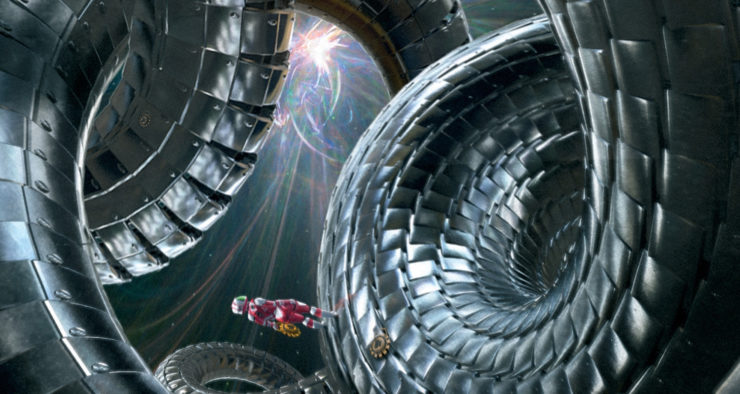I almost didn’t make my protagonist autistic, when I wrote my debut novel The Outside. I almost wasn’t brave enough.
This is ironic, because I know the importance of good autistic representation better than most. I’m autistic myself, and for years I’ve run a reviews series called Autistic Book Party where I talk in depth about autistic characters in science fiction and fantasy, what makes them work when they work and what makes them hurtful when they fail. After years of work on this topic, I think I can speak with authority about how these things feel.
For instance, I know the peculiar thrill of recognizing myself in a strong character like Xandri Corelel, the protagonist from Kaia Sønderby’s Failure to Communicate.
Xandri is a human who interprets alien behavior for a living—using the skills that she honed all her life as an autistic person in an ableist world, working to understand the behavior of other humans. Xandri makes decisions in the same way I do, a way I rarely see represented in the science fiction heroes I love: clearly smart but doubting herself, easily led astray, easily overwhelmed. Her disability and her self-doubt are used to take advantage of her—and when this becomes clear, she thinks quickly and bravely and saves the day anyway.
I know how it feels to encounter a character like Dedéi from R.B. Lemberg’s “Geometries of Belonging”—an autistic character with visibly non-normative movement and speech, whose parents want a magical cure that would involve rewriting their mind, and who loudly insists that they do not want one. Parét, the healer who is summoned to cure Dedéi, immediately accepts them and respects their choice; he helps Dedéi escape. When so many people deny that autistic people should have a say in our own treatment, seeing Dedéi taken seriously is a breath of fresh air.
But I also know the peculiar pain of stories that seem to betray an author’s contempt for autistic people, their belief that we’re emotionless or wretchedly irritating or just not quite human.
I’ve read many characters like Daymar from Steven Brust’s Hawk: autistic-coded characters who are clever and helpful and even polite, but who are treated like irritating burdens, valuable only for their ability to help the neurotypical characters before being pushed away again.
Worse, I’ve read stories in which abusive behavior towards autistic children and teens—forcibly restraining them when they show distress, punishing them for avoiding their bullies, wishing them dead, even sexual abuse—are portrayed as inevitable and fine.
When I sat down to write my own book, I was very afraid of accidentally writing one of these negative examples, something that would hurt other autistic readers who came across it.
Marginalized people often do this to ourselves, twisting ourselves into knots in fear that we’ll write something problematic. Some privileged authors do this too, of course—people who don’t share a marginalization, and who want to write about it anyway, and who get scared that a marginalized person will take offense. But the fear I have seen from other #ownvoices authors is a specialized breed, one that I don’t think out-group authors quite share. It’s not just the fear that someone will be angry; on some level, it’s a fear that something inside us is wrong. We fear that writing from our hearts about our own experience will turn out to be wrong, or harmful, and we feel that fear deeply because we’ve been harmed that way so many times.
For The Outside, my fear was complicated because it’s such a dark book. Yasira Shien, The Outside’s protagonist, is caught in the middle of a conflict between two dark powers vastly more powerful than herself. In the first few chapters, an accident occurs at her job that kills over a hundred people—an accident for which she knows she’ll be blamed. In the rest of the book, she experiences a variety of Lovecraftian horrors, kidnapping, torture, heartbreak, a threat to her whole planet, and the suggestion that she herself may have uncanny powers she doesn’t understand. She begins the book mildly burned out, and by the end, there’s almost nothing left of her.
Did I really want to write an autistic character going through these things—especially the supernatural elements of the book? Would people think, if I went that route, that I believe autistic people should be hurt in these ways, or that we’re all secretly Lovecraftian monsters and don’t know it?
Autism and magic can be done well. I’m very fond of Dora M. Raymaker’s Hoshi and the Red City Circuit, for instance, in which the autistic protagonist’s special interest in her home city turns out to be an actual magical bond. But it’s very easy to use such abilities to other the autistic character, to make them less human, or to veer into the Magical Disabled Person trope—reducing them to a supernatural tool which, like Brust’s Daymar, is only there to be useful to able-bodied people.
And The Outside didn’t just have a potential problematic autistic heroine—it also had a potentially autistic villain.
That villain was Dr. Evianna Talirr, Yasira’s former mentor, a character even more caught up in the story’s Lovecraftian elements than Yasira.
I loved everything about writing Talirr, who has a distinctive, rambling way of speaking and a million shiny mad-scientist toys to play with, and who harbors some legitimate grievances against civilized society. Talirr was the first character, even before Yasira existed, who struck me as possibly autistic. But if Yasira’s arc was problematic, Talirr’s was even worse.
It’s odd, but in spite of the negative traits that are often attributed to autistic people, I don’t encounter many villainous autistic characters—or even dark autistic antiheroes.
The autistic or autistic-coded villains I do see often have troubling implications. Like Crake from Margaret Atwood’s Oryx and Crake, who functions as a villainous exaggeration of all the worst stereotypes of Asperger syndrome: obsessed with his own intelligence, dismissive of normal people and of all emotional or moral concern about his actions. Or Entrapta from “She-Ra and the Princesses of Power”—who I mostly love, because she is adorable and funny and great, but who is so oblivious to the consequences of her research that she doesn’t seem to notice even when it’s ending the world.
There’s one other book I can think of that does portray autism in both heroes and villains, in a setup that vaguely resembles mine. That book is Pilgrennon’s Beacon by Manda Benson. Pilgrennon’s Beacon is an #ownvoices book about an autistic teenager named Dana who is caught up in a power struggle between two morally ambiguous scientists, one of whom is also autistic. I liked the dynamic between Dana and Jananin, the autistic scientist, but the book’s resolution didn’t work for me. It ended with both scientists and Dana banding together against a larger threat, which meant that the neurotypical scientist—a character involved in ongoing medical abuse of children like Dana—was forgiven for his deeds with a narrative shrug.
Buy the Book


The Outside
If I wrote Dr. Talirr as autistic, would I inadvertently commit the same mistakes? I was afraid so. In my first draft, Yasira and Dr. Talirr weren’t marked as autistic at all.
But it turned out I couldn’t keep that up. By the time I was midway through the book, I’d realized that autism was integral to both characters, whether I marked it or not.
Dr. Talirr’s ramblings were not dissimilar to some of mine in certain moods. Her trauma-fueled anger against the system she grew up in, as reluctant as I was to admit it, was also relatable.
Yasira’s was also fundamentally autistic. She’s overwhelmed by her supernatural experiences in a way that resembles my own daily sensory and cognitive overload. Outside’s surreal qualities are themselves inspired by my autistic experience. Simply going into an unfamiliar place can be overwhelming for me, and The Outside isn’t the first time I’ve used surreal imagery to try to convey that experience. (For instance, there’s the short story “And All The Fathomless Crowds,” in which simple outdoor objects from statues to bulldozers come to life in threatening ways.) For Yasira to engage with overwhelming experiences in a way that made sense to me, she had to have at least some autistic traits.
To try to excise the autism from these characters would be to erase the very things that made them interesting to me in the first place. That wasn’t really an option. My only choice was whether the autism should be subtext or text.
I chose text, and that meant a lot of revision, not only to label the characters properly but to flesh out the other ways that their autism affected their experiences. It meant thinking about things like: Yasira’s responses to non-magical traumatic events, the accommodations that are and aren’t provided for her at work, the way Yasira’s girlfriend helps ensure her access needs are met, and the way she and Dr. Talirr relate to each other as a pair of autistic people in an autistic-unfriendly environment.
Making the autism explicit made the book less problematic—in part because it allowed me to show a fuller picture of autism, with more facets besides just the Lovecraftian ones.
The Outside is out in stores now. It’s garnering praise for its characters, for its unusual take on cosmic horror, and for Yasira and Dr. Talirr specifically, two autistic women with two very different responses to the terrifying events that are happening around them.
It worked, in other words. And none of that would have happened if I’d listened to my fear.
Ada Hoffmann is a Canadian graduate student trying to teach computers to write poetry. Her acclaimed speculative short stories and poems have appeared in Strange Horizons, Asimov’s, Uncanny, and two year’s best anthologies. Ada was diagnosed with Asperger syndrome at 13, and is passionate about autistic self-advocacy. She is a former semi-professional soprano, a tabletop gamer and an active LARPer, she lives in southern Ontario with a very polite black cat.










